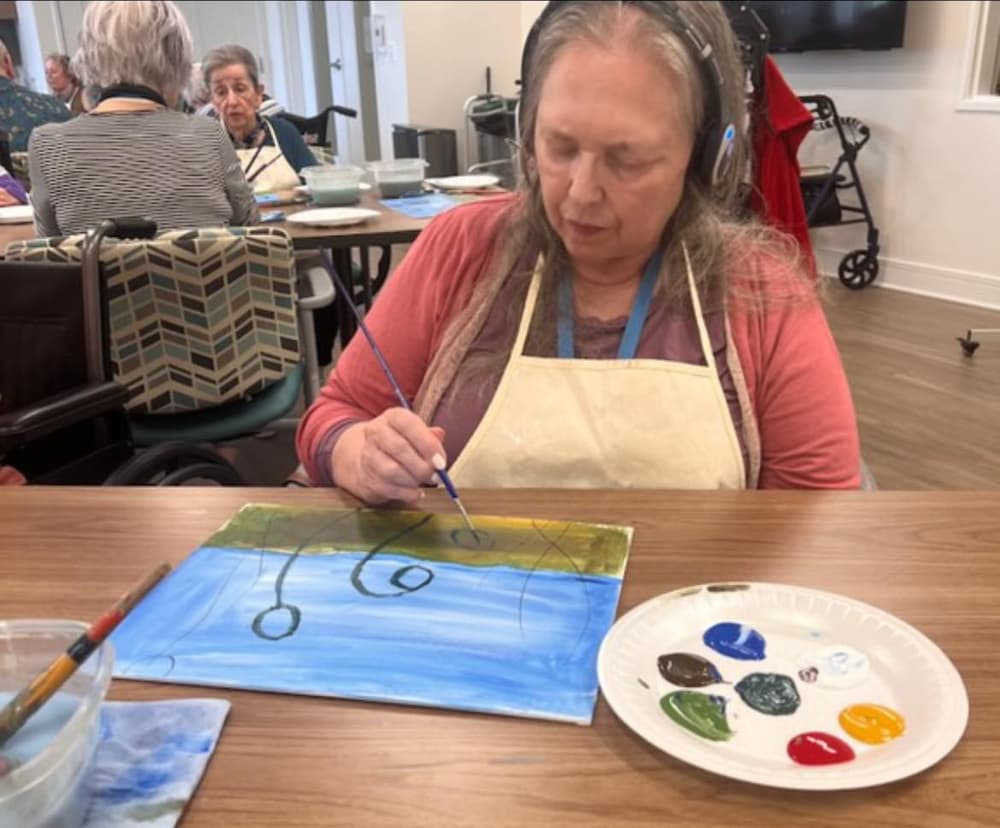
One of Kelly Burnett’s favorite stories about using The Carrington at Lincolnwood’s new Eversound technology happened during movie night. The director of dementia programs connected the system to the TV and placed headphones on memory care residents.
“I heard the loudest singing coming from the living room,” she says. “I went back in to see one of the ladies wearing the headset and sitting up straight in her chair singing along to the opening song of “Oklahoma!”
The wireless group listening system, which supports older adults with hearing loss and cognitive decline, is just one example of how The Carrington uses assisted living technology and dementia care technology to provide residents with the best possible care and services.
“Over 80% of older adults live with severe to profound hearing loss. This, coupled with residents living with brain change, can make the world seem smaller and make residents less likely to engage,” Kelly explains. “We use Eversound daily in memory care for exercise classes, music, art groups and reminiscing so residents can actively participate in the programs.”
One heartwarming moment involving the new technology for persons with dementia happened during Songs by Heart, a weekly therapeutic music program. A resident who usually falls asleep during the sessions was wearing headphones, fully engaged and singing along to “You Are My Sunshine.”
“I was able to capture it on video and send it to her family, who loved it,” Kelly says. “They told me how meaningful it was to hear her sing that song again; it was what she used to sing to her grandkids.”
Another use of innovative memory care technology designed to improve residents’ lives is Lucynt, a table that uses projection and sound to create a relaxing environment that promotes fun, activity and mental stimulation.
Lucynt offers a variety of games to improve hand-eye coordination, bring back memories with pictures and encourage group activities, which helps residents feel better emotionally, socialize more and stay physically active. The table allows for free play, boosting residents’ self-esteem and helping them further increase their manual dexterity.
“For residents in the middle stages of dementia, the games promote physical activity, social interaction and feelings of accomplishment,” Kelly says. “The games for people in the later stages draw them in with engaging videos and soothing music and respond with colorful bursts and slight movement over the image.”
Specialized Training Enhances Memory Care Technology
In 2021, The Carrington introduced MOSAIC Personalized Care, a comprehensive memory care approach inspired by Teepa Snow’s Positive Approach to Care model. MOSAIC aims to improve daily experiences, preserve dignity, offer peace of mind and encourage independence for residents with cognitive decline or memory loss.
Unlike standardized programs, MOSAIC provides three levels of tailored, person-centered care:
- Promenade—Provides in-home support to help residents live as independently as possible.
- Mezzanine—Supports early- to mid-stage memory care, bridging the gap between independent/assisted living.
- Tessera—Offers a unique approach to long-term memory care.
Kelly conducts a thorough orientation training for all new hires that incorporates Positive Approach to Care philosophies. Kelly, along with other team members, have also completed a Positive Approach to Care Champion Course, which focuses on using technology for persons with dementia and improving how caregivers interact with them.
The course teaches hand-under-hand touch for more effective and less threatening connections. It also helps caregivers assess residents’ stages in the dementia classification model to support their cognitive and physical abilities better.
Kelly and her memory care team always look for ways to enhance their dementia knowledge and care skills to improve resident experiences. With her recent certification as a Positive Approach to Care Certified Independent Trainer, she brings even more expertise and experience to The Carrington.
Transforming Care by Building Connections With People Living With Dementia
Kelly is now certified to train others in Teepa Snow’s Positive Approach to Care philosophy, teaching awareness, knowledge and skills in classrooms, communities and support groups. This model helps learners understand how a person with dementia experiences the world.
The hands-on, interactive course covers dementia awareness, various learning styles and engaging facilitation techniques. Kelly’s certification included online and classroom sessions, with in-house training conducted by a certified independent trainer and consultant.
The trainer certification process introduced Kelly to the Adult Experiential Learning Cycle (AELC), which focuses on using different learning styles to connect with learners effectively. Using the AELC model, the memory care team can experience scenarios, discuss their feelings, understand the reasons behind them, link them to existing knowledge and apply what they’ve learned.
“The training transformed how I teach new hires and current team members to connect and build relationships with residents living with dementia,” she says. “This approach encourages us to learn from each other, deepen our understanding of dementia and provide better care.”
The Carrington’s Mezzanine life enrichment coordinator, Suzanne Johnson, recently completed Teepa Snow’s engagement leader class and is working on her certification,” Kelly says. “We’re excited to implement what Suzanne has learned into our memory care offerings so we can better engage the residents with meaningful and purposeful programs.”
If someone you love shows signs of cognitive decline or memory loss, discover more about The Carrington at Lincolnwood’s memory care services.
